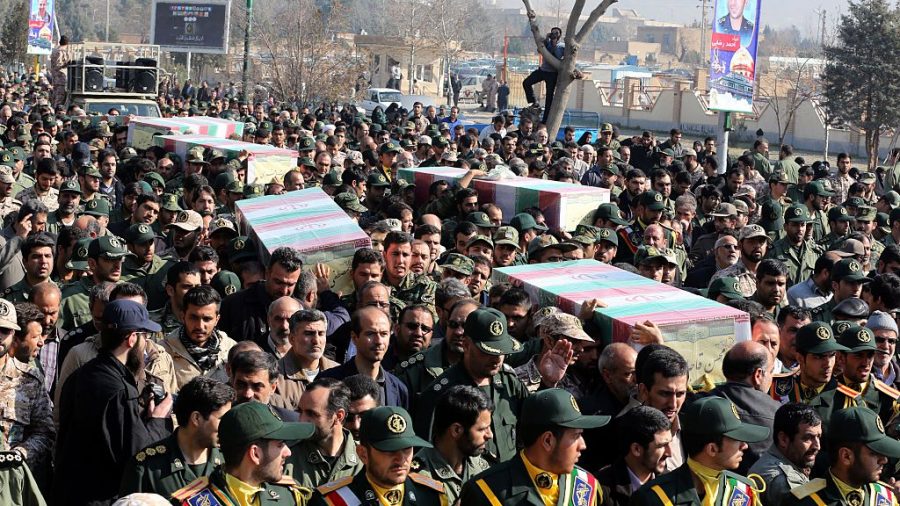The Trump administration on April 8 announced that it was designating Iran’s Islamic Revolutionary Guard Corps as a foreign terrorist organization, “the primary entity that carries out its global campaign of terror,” the White House said in a statement.
While people and entities related to the Islamic Revolutionary Guard Corps (IRGC) have been sanctioned, the White House said this is the first time that a branch of another government has been designated as a foreign terrorist organization.
Set up after the 1979 Islamic Revolution with the mission of protecting the Shi’ite clerical ruling system, the IRGC is Iran’s most powerful security organization and has a large influence in its political system, controlling large swathes of the economy and the armed forces.
With the rightful designation of the IRGC as foreign terrorist organization, it should be clear to all that there are risks to supporting the IRGC in any way. Iran continues to use terrorism to target the United States, and our allies and partners. https://t.co/TmtJzEJXEa
— John Bolton (@AmbJohnBolton) April 8, 2019
The action has broader implications than for the IRGC alone—governments and private sector entities that do business with the IRGC or its shell companies could now receive up to 20 years in prison and be barred from entering or doing business in the United States.
IGRC-backed companies and institutions funnel money to such terrorist organizations as Hamas, Hizballah, and the Palestinian Islamic Jihad, with Iran spending “nearly a billion dollars every year” to support terrorism, according to the White House.
“The Iranian regime is the leading state sponsor of terror. It exports dangerous missiles, fuels conflicts across the Middle East, and supports terrorist proxies,” President Donald Trump said in a statement. “If you are doing business with the IRGC, you will be bankrolling terrorism.”
For example, the United States has been at odds with Iran over its influence in Yemen, where the Iranians have supported the Houthi rebels that overthrew the Yemen government in 2015.
The Revolutionary Guard’s Qods Force has been accused of planning attacks in Germany, Bosnia, Bulgaria, Kenya, Bahrain, and Turkey. In 2011, a plot by the Qods force to kill the Saudi ambassador to the United States was uncovered in Washington.
In 2007, the U.S. Treasury designated the Qods Force unit in charge of operations abroad “for its support for terrorism,” and has described it as Iran’s “primary foreign action arm for executing its policy of supporting terrorist organizations and extremist groups.”
Iran immediately condemned the foreign terrorist designation as an illegal act prompted by Tehran’s regional influence and “success in fighting against Islamic State,” according to state television.
After reports of the planned U.S. designation emerged late on April 5, Iranian lawmakers warned Tehran would take reciprocal action.
Tensions between the two countries have grown since Trump pulled the United States out of a 2015 nuclear deal with Tehran last May and reimposed sanctions that had crippled Iran’s economy. Trump said the accord did not address Iran’s ballistic missile activity or its malign influence in the region.
The IRGC is in charge of Iran’s ballistic missiles and nuclear programs. Iran has warned that it has missiles with a range of up to 1,242 miles, putting Israel and U.S. military bases in the region within reach.
The announcement comes ahead of a May 2 deadline by the United States on whether or not to extend oil waivers to eight importers of Iranian oil, including China, India, Japan, South Korea, and Turkey.
Reducing the number of waivers will limit oil exports from Iran, the fourth-largest oil producer in OPEC, but the United States is unlikely to meet its earlier target of driving Iranian oil exports to zero.
Reuters contributed to this report.

